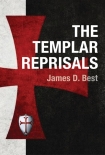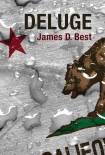The Templar Reprisals (The Best Thrillers Book 3) by James Best (read any book txt) 📕

Read free book «The Templar Reprisals (The Best Thrillers Book 3) by James Best (read any book txt) 📕» - read online or download for free at americanlibrarybooks.com
- Author: James Best
Read book online «The Templar Reprisals (The Best Thrillers Book 3) by James Best (read any book txt) 📕». Author - James Best
Evarts said this last to gauge O’Brian’s reaction. He remained stoic.
“What about the second car?” O’Brian asked.
“Gone without a trace. The car seems to have disappeared, along with its occupants.”
“Odd. The only freeway was covered within minutes. How about CCTV?”
“Nada,” Evarts answered.
“How do you think they escaped?”
“Secondary surface road. Probably state route 192 through the foothills.”
O’Brian thought. “That would require reconnaissance.”
“Yes.”
“What else?”
“Guns and ammunition clean. The dead both carried Kahr Arms – CW40s and all the shots fired were .40 caliber. We think all four were fitted up identically.”
O’Brian nodded. “Not exactly weapons favored by jihadists or Saturday Night Specials. What about the car?”
“Clean of cigarettes, candy wrappers, all other foreign material other than threads identified as coming from Levi’s. For the olive drab obsessed, Levi is a popular brand of denims.”
O’Brian ignored his attempt at humor. “Anything else?”
“No. Now, what do you have for me?”
He didn’t hesitate. “You asked if French higher-ups were complicit, if the Templars don’t want their existence exposed, or if Templars have infiltrated our security services.”
O’Brian took a sip of coffee for dramatic affect.
“The answer is yes … to all three.”
Chapter 17
Evarts left O’Brien’s office troubled. The general had explained that the Templars Knights did exist and their vigilantism real. Their society was secret, and no western intelligence service had succeeded in infiltrating the organization, mostly because the Templars accepted new members only after years of vetting. Despite centuries of rumors, Templar affiliation with Freemasons remained unverified. Masons officially recognized three degrees: Entered Apprentice, Fellowcraft, and Master Mason. Scottish chapters recognized thirty-three degrees, but the Scots insisted that only three degrees mattered and their higher number of degrees merely granularized the official three. O’Brian alleged that a covert fourth degree did exist, and the name of this degree was Templar Knights. American intelligence services estimated that worldwide there were about a thousand Masons who had attained the status of Knight, however, the question remained whether Templar Knights continued to be part of the Freemasons. Some intelligence officials theorized that Templar Knights had ascended to an elite clandestine society that operated independently from the Masonic Fraternity.
O’Brian had explained other theories and conjectures. Some believed the Templar Knights had integrated with the Scottish Masons around 1307, when the persecuted Templars had fled France in a fleet of eighteen ships. The ships had supposedly sailed to Scotland and the Templars had found shelter within a masons’ guild, eventually taking it over. The Scottish Masons slowly evolved away from masonry to a quasi-secret society that adopted many Templar rituals and beliefs. As the centuries passed and Masons expanded worldwide, the original meanings of their rituals faded, their heritage became muddled, and most lodges had no inkling of a Templar legacy. Not so with an inner circle of Scottish Masons. That group never lost sight of their purpose, but they remained quiescent until the establishment of Israel in 1948. The once ceremonial secret society took the emergence of a Judeo nation in the Holy Land as a sign that they were to become operational again. They reestablished their quasi-military arm to help protect Israel and combat Islamic terrorism worldwide.
After their allotted hour had been consumed, they had agreed to meet again for dinner. Evarts had been mulling this over on the short taxi ride to his hotel. As he entered the lobby, a man approached, called him by name, and offered his hand.
Without extending his own hand, Evarts asked, “I’m sorry, do I know you?”
“Jim Lewis. I see you’re a traveling man.”
This was one of the code phrases that Masons used to identify each other. Evarts gave the correct response and shook hands in the appropriate fashion. Evarts was wary. The man was in his late fifties to early sixties with a paunch that hung over his trouser belt. He appeared innocent; the type of hearty goodfellow that he had found in every Mason lodge. Except Evarts didn’t believe in coincidence and he wondered how the man knew his name before introductions.
“How did you recognize me?” Evarts asked.
“I attended a lodge meeting in Santa Barbara a few years back. I was surprised to spot you all the way across the country in the lobby of a Pentagon City hotel. Here on business?”
Evarts had made his own arrangements and chose a Ritz-Carlton near the Pentagon. He didn’t expect to stay more than the night.
“Yes. Short visit.”
“Me too. Perhaps I can buy you lunch.”
“I’m still on West Coast time, so I’m not hungry yet,” Evarts answered. “I was going to walk to Arlington Cemetery to work up an appetite and pay my respects.”
“Perfect. May I join you.” He patted his stomach. “I need a little exercise and I’m free until a dinner appointment.”
Evidently Lewis was not to be gotten rid of easily. It didn’t matter. Evarts needed to find out why this supposed accidental meeting had been staged. He attended his lodge meeting irregularly, but he did attend. It was possible that he and Lewis had met a couple years ago, and the man hadn’t made a strong impression. Possible, but unlikely. He had a policeman’s memory for names and faces, and guests from other lodges were introduced with fanfare.
“I’m done with business for the day and was heading to my room to change into casual clothes. Why don’t we meet back here in fifteen minutes?”
“Perfect. I’ll change, as well.”
When they rode up the elevator, Lewis got off on a lower floor, while Evarts continued up to the concierge level. He didn’t call O’Brian until he was inside his suite. At first, his assistant insisted the general couldn’t be disturbed, but Evarts persevered until O’Brian took the call.
After a terse description of the encounter, Evarts asked, “Jim, what do you think?”
“We need to discover what Mr. Lewis is up to. Stall about twenty minutes. I’ll have you shadowed.”
O’Brian hung up.
Evarts took his time changing





Comments (0)